SHRI SHIVAJI SCIENCE COLLEGE, AMRAVATI
DBT STAR COLLEGE PROJECT ACTIVITY
ACTIVITY REPORT
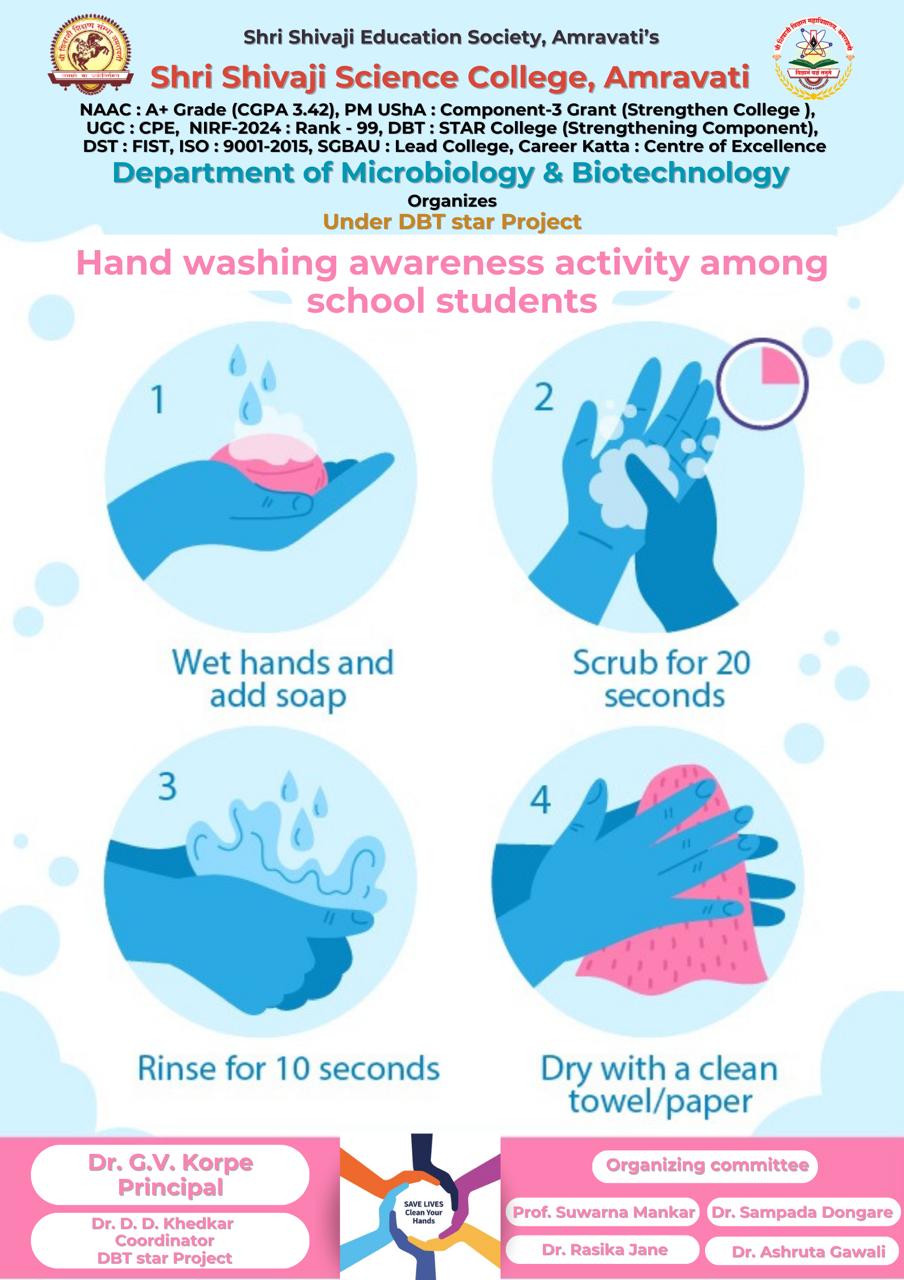
Hand Washing Awareness Activity: A Report on a Community Health Initiative
Activity Dates: 10/08/2024, 17/08/2024, 31/08/2024
Type of Activity: Outreach Activity
Organizing Department: Department of Microbiology
Program Coordinators: Dr. Rasika Jane, Dr. Ashruta Gawali
Head of the Department: Dr. D. D. Khedkar
External Collaborator (if any): Nil
Objectives:
- 1. Promote Hygiene Education: To educate school students on the importance of hand washing as a fundamental hygiene practice to prevent infections and diseases.
- 2. Disease Prevention: To reduce the spread of common illnesses like diarrhea, flu, and respiratory infections by encouraging regular hand washing among young students.
- 3. Teach Proper Hand Washing Techniques: To demonstrate the correct hand washing techniques, including the use of soap and the right duration for effective cleaning.
- 4. Raise Awareness on Germ Transmission: To help students understand how germs are transferred through hands and how regular hand washing can act as a barrier to stop the spread of harmful microorganisms.
- 5. In still Lifelong Habits: To foster the development of good hygiene practices from an early age, promoting long-term health and well-being.
No of Beneficieries: 75
Classes Involved: B.Sc III And B.Sc II
Venue of the Activity: Z P. Primary school, Koltek, Bhatkuli , : ZP upper primary school, Rajanapur (KHI), Tq- Murtizapur , Shri Munikramji Gandhi Vidyalaya, Dhanodi, tq- Chandur Rly.
Activity Report:
In the modern era, where infectious diseases continue to pose significant global health risks, the simple act of handwashing stands as one of the most effective measures to prevent the spread of harmful germs and viruses. To raise awareness about this essential hygiene practice, Microbiology students organized a hand washing awareness campaign for school students to emphasize the importance of proper hygiene practices. Through interactive activities such as street plays, dances, slogans, and educational displays, the students creatively demonstrated the significance of hand washing in preventing the spread of infections and maintaining good health. The campaign highlighted how germs spread through unclean hands and the simple, yet powerful role hand washing plays in disease prevention. By engaging young students with scientific facts and practical demonstrations, the campaign aimed to instill lifelong hygiene habits and contribute to healthier school environments.
The faculty members who took on the responsibility of leading this initiative were Dr. Sampada Dongre, Dr. Rasika Jane, Ms. Suwarna Mankar, Dr. Ashruta Gawali, Ms. Soniya Kandare, Ms. Dnyaneshwari Chokhat, and Ms. Komal Nagpure. Their collective efforts made this event a resounding success, ensuring that the message reached not only the students but also the broader community. This report provides an in-depth account of the event, its execution, and the broader social responsibility of microbiology students in promoting public health awareness.
Today’s Need for Handwashing Awareness
Handwashing, though seemingly a mundane task, has far-reaching implications for public health. According to the World Health Organization (WHO), regular handwashing with soap can reduce diarrheal diseases by up to 50% and respiratory infections by nearly 25%. Despite these staggering statistics, proper handwashing practices are still not universally followed, especially among children who are particularly vulnerable to infections. In an age where global pandemics like COVID-19 have highlighted the importance of hygiene, handwashing has become more than just a preventive measure; it is a global health necessity.
Schools, where children gather in close proximity, often become hotspots for the transmission of infectious diseases. Therefore, educating young students on the importance of hand hygiene can have a profound impact, not just on their health but on the health of their families and communities as well. The need for this awareness is even more critical in underprivileged areas where access to healthcare and education about hygiene is limited.
In this context, the handwashing awareness activity organized by the Department of Microbiology could not have been more timely. By focusing on school students, the initiative aimed to instill in them a lifelong habit of hand hygiene, which can protect them from a wide range of infectious diseases and contribute to the overall well-being of society.
Event Overview: Spreading Awareness Through Creativity
The handwashing awareness campaign was designed to be both educational and entertaining, ensuring that the students remained engaged while absorbing the crucial message. The event was a vibrant blend of educational street plays, energetic dances, thought-provoking slogans, and scientifically backed visuals, all crafted to convey the importance of hand hygiene in a manner that was easily understandable by children.
Street Play: The street play, performed by the microbiology students, was the highlight of the event. With a lively and interactive format, the play dramatized the dangers of poor hand hygiene. Characters representing harmful bacteria and viruses demonstrated how easily infections could spread through dirty hands, while other characters portrayed the benefits of proper handwashing. The use of humor and drama ensured that the message was conveyed in a lighthearted yet effective manner.
Dance Performances: Dance routines were also incorporated into the event, each choreographed to promote the message of handwashing. The combination of music and movement allowed the students to connect with the message on an emotional level. Through symbolic gestures, the performers demonstrated the six steps of proper handwashing, ensuring that the students not only understood but could also replicate the process in their daily lives.
Slogans and Posters: Catchy slogans such as “Clean Hands, Healthy Lives” and “Fight Germs, Wash Your Hands” were displayed prominently throughout the event. These short and memorable phrases were designed to stick with the students long after the event ended. Additionally, colorful posters and educational banners filled with scientific information about the benefits of hand hygiene were used to reinforce the key points. These visuals served as a quick reference for the students and helped in making the science behind handwashing more approachable.
Educational and Scientific Information: To complement the creative presentations, scientific posters were displayed, showcasing the microbiological perspective of handwashing. These posters depicted the invisible world of bacteria and viruses, highlighting how they could be easily removed through proper handwashing. Faculty members also delivered brief presentations, explaining the role of soap and water in breaking down and removing germs from the skin, further educating the students on the science behind the practice.
Social Responsibility of Microbiology Students
As students of microbiology, the participants had a unique advantage in understanding the importance of hand hygiene from a scientific perspective. But beyond their academic knowledge, this event allowed them to step into the role of health educators, a responsibility that extends far beyond the walls of their laboratories.
The students’ participation in the awareness activity exemplifies the vital role that microbiology students can play in public health outreach. Equipped with a deep understanding of pathogens and the mechanisms of disease transmission, microbiology students have a responsibility to share their knowledge with the public, especially in areas where health literacy is low. In doing so, they contribute to the prevention of disease outbreaks and promote healthier communities.
By engaging directly with young students, the microbiology students in this event were able to make a lasting impact on the next generation. Through their creative presentations and scientific explanations, they helped to demystify the concept of germs and hygiene, making it accessible to young minds. The social responsibility that comes with this knowledge cannot be understated—microbiology students have the ability to influence public behavior and shape healthier societies.
Furthermore, this event demonstrated how student initiatives can bridge the gap between academia and the community. It showcased the potential of scientific knowledge to address real-world issues, fostering a sense of civic responsibility among students. The participants not only learned how to communicate complex ideas in simple ways but also gained a deeper understanding of the impact that their education can have on society.
In today’s world, where the threat of infectious diseases looms large, hand hygiene remains a simple yet powerful tool in safeguarding public health. Through initiatives like this, the Department of Microbiology is not only fulfilling its academic mission but also making a meaningful contribution to society.
Outcomes of Hand Washing Awareness by Microbiology Students for School Students:
1. Improved Hygiene Practices: School students develop better hand washing habits, reducing the risk of infections and promoting a healthier school environment.
2. Increased Awareness: Students gain a deeper understanding of the role hand washing plays in stopping the transmission of germs and preventing illnesses.
3. Behavioral Change: A noticeable shift in behavior, with students practicing regular and proper hand washing, especially before meals and after using the restroom.
4. Community Impact: The campaign creates a ripple effect, as students share their newfound knowledge with peers, families, and the wider community, spreading the message of hygiene.
5. Healthier School Environment: With reduced transmission of infections, schools experience fewer outbreaks of common illnesses, contributing to better attendance and student well-being.
6. Strengthened Public Health Efforts: The awareness campaign supports broader public health initiatives focused on hygiene and disease prevention, reinforcing community health efforts.
Outcomes:
- 1. Improved Hygiene Practices: School students develop better hand washing habits, reducing the risk of infections and promoting a healthier school environment.
- 2. Increased Awareness: Students gain a deeper understanding of the role hand washing plays in stopping the transmission of germs and preventing illnesses.
- 3. Behavioral Change: A noticeable shift in behavior, with students practicing regular and proper hand washing, especially before meals and after using the restroom.
- 4. Community Impact: The campaign creates a ripple effect, as students share their newfound knowledge with peers, families, and the wider community, spreading the message of hygiene.
- 5. Healthier School Environment: With reduced transmission of infections, schools experience fewer outbreaks of common illnesses, contributing to better attendance and student well-being.
Photos:
 Representation of Bacteria on Hand |  Highliting the vital role of hygine health through power slogans- Microbiology students |
 Action speak louder than words- using mime to creatively demonstrate imp of hand washing |  Streetplay showcasing importance of hand hygine |
 Microbiology students demonstrating imp of hand washing through experiment | 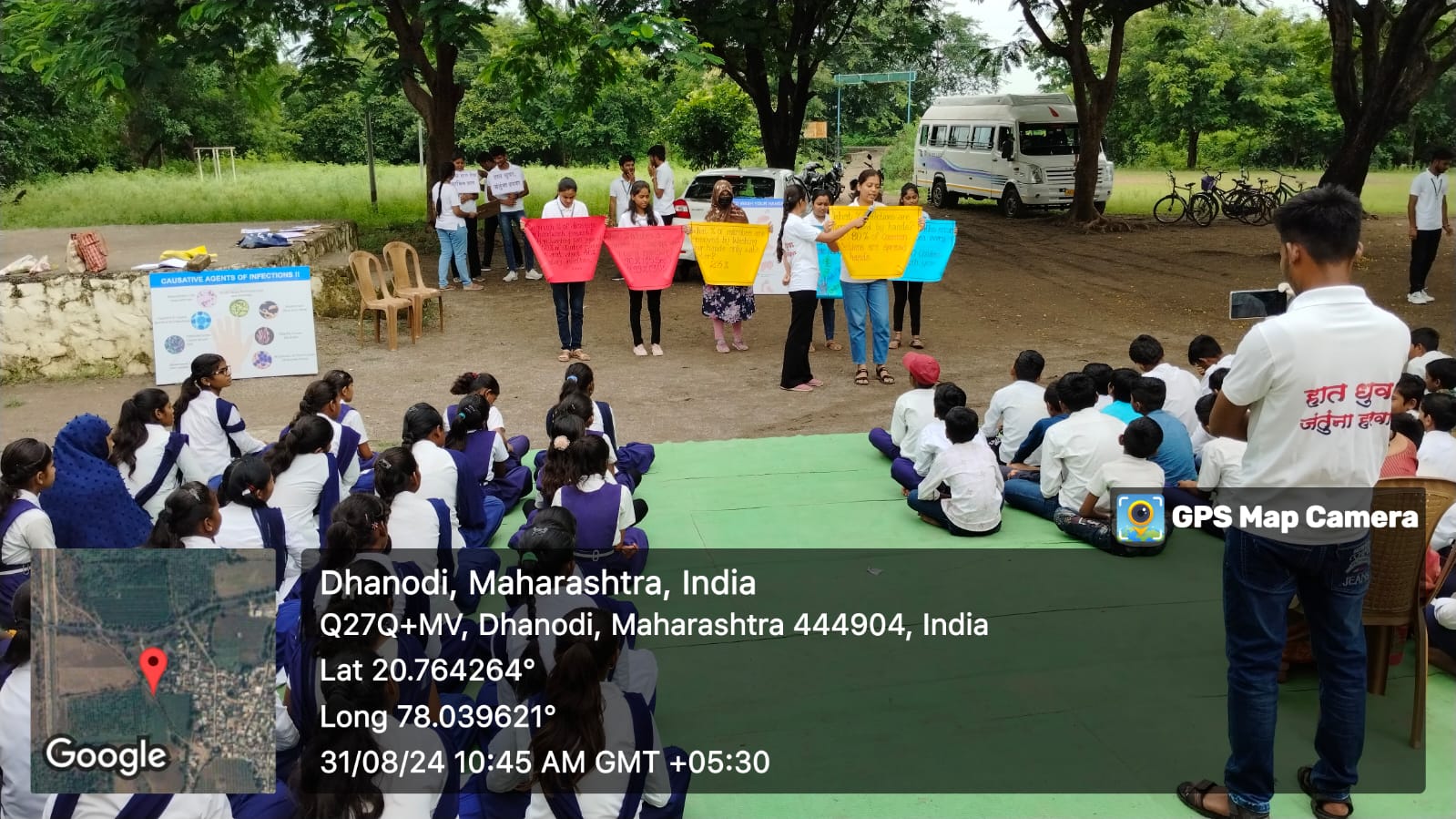 Scientific Informative session |
Attendance Sheet:
 |
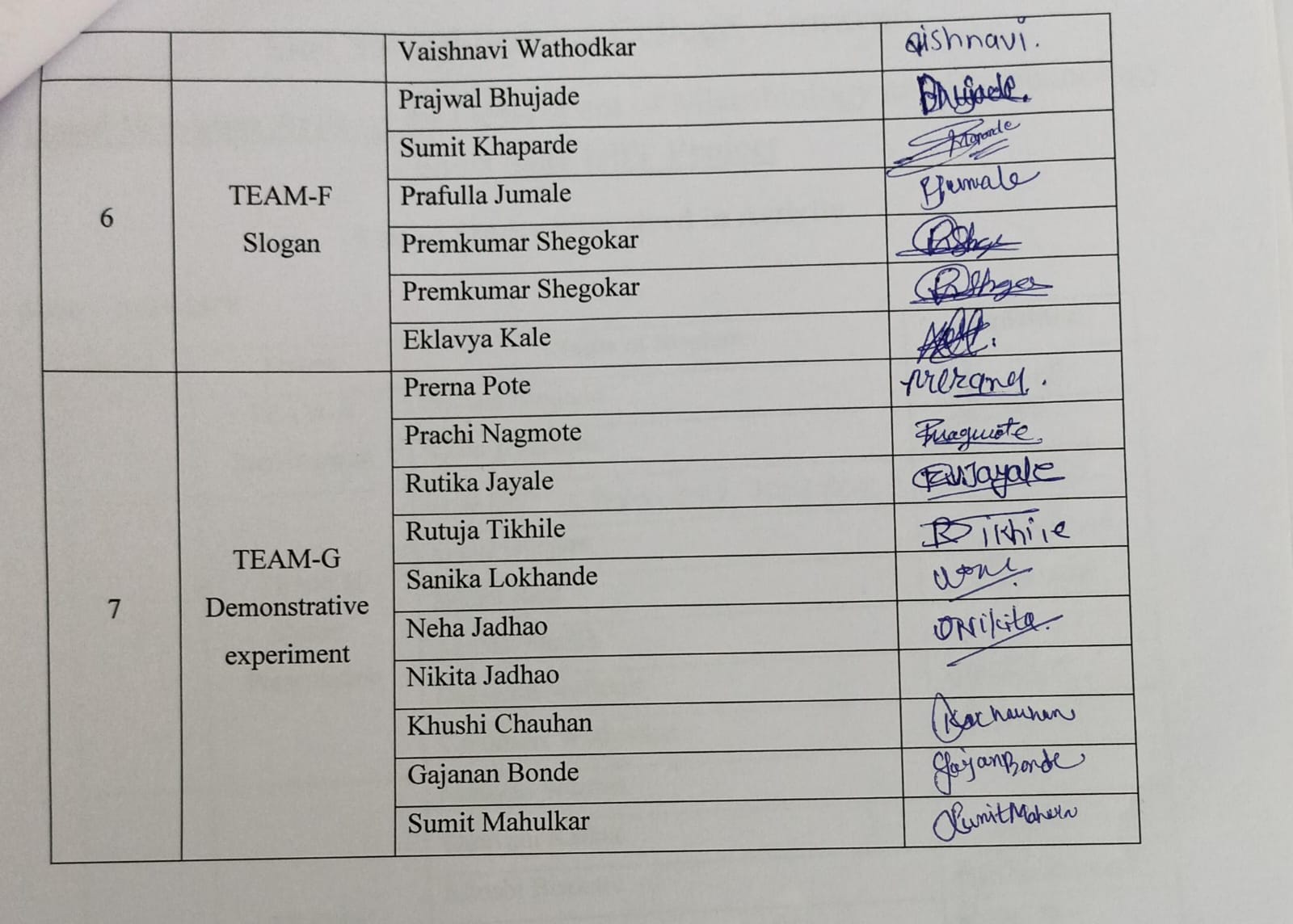 |
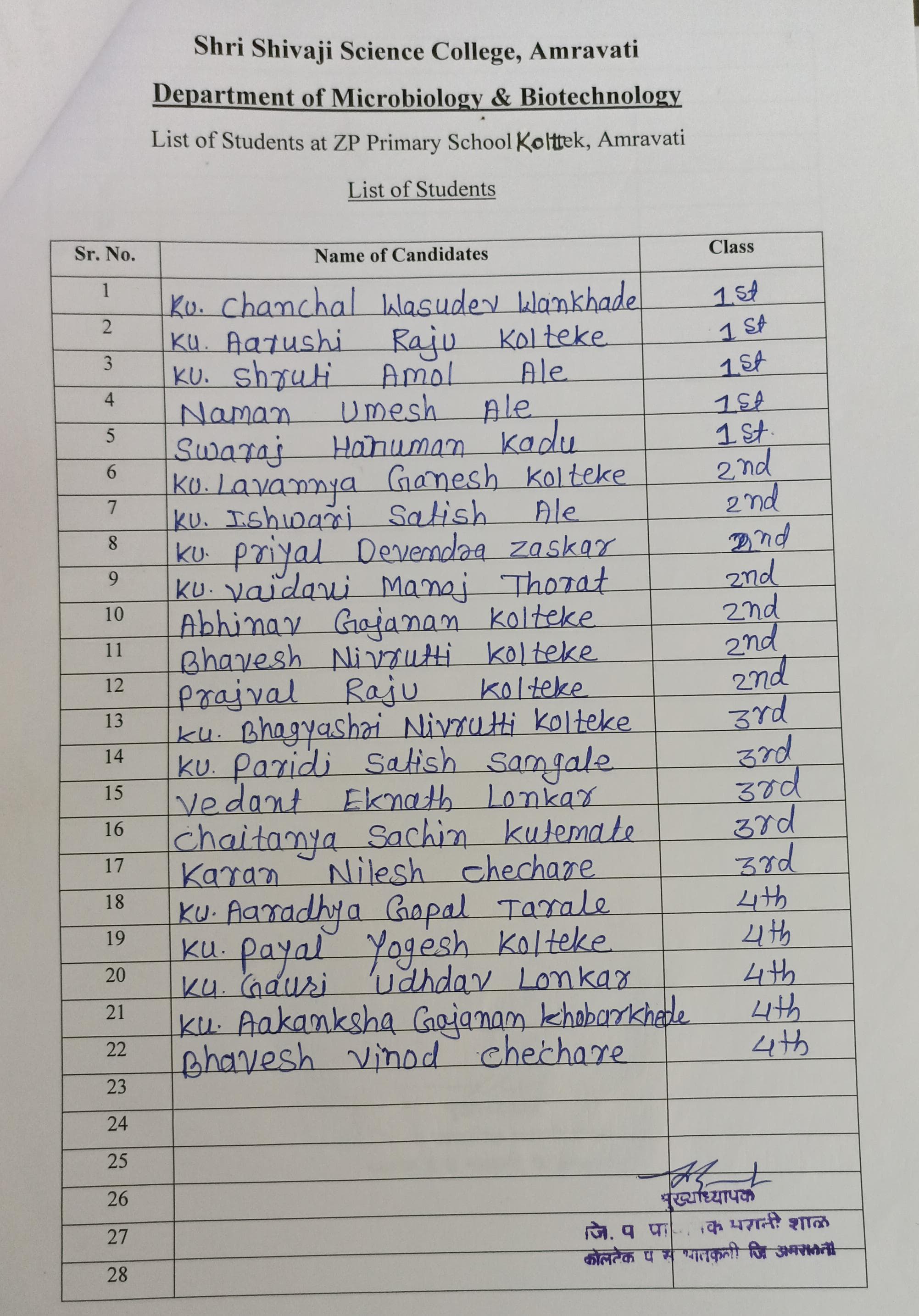 |
 |
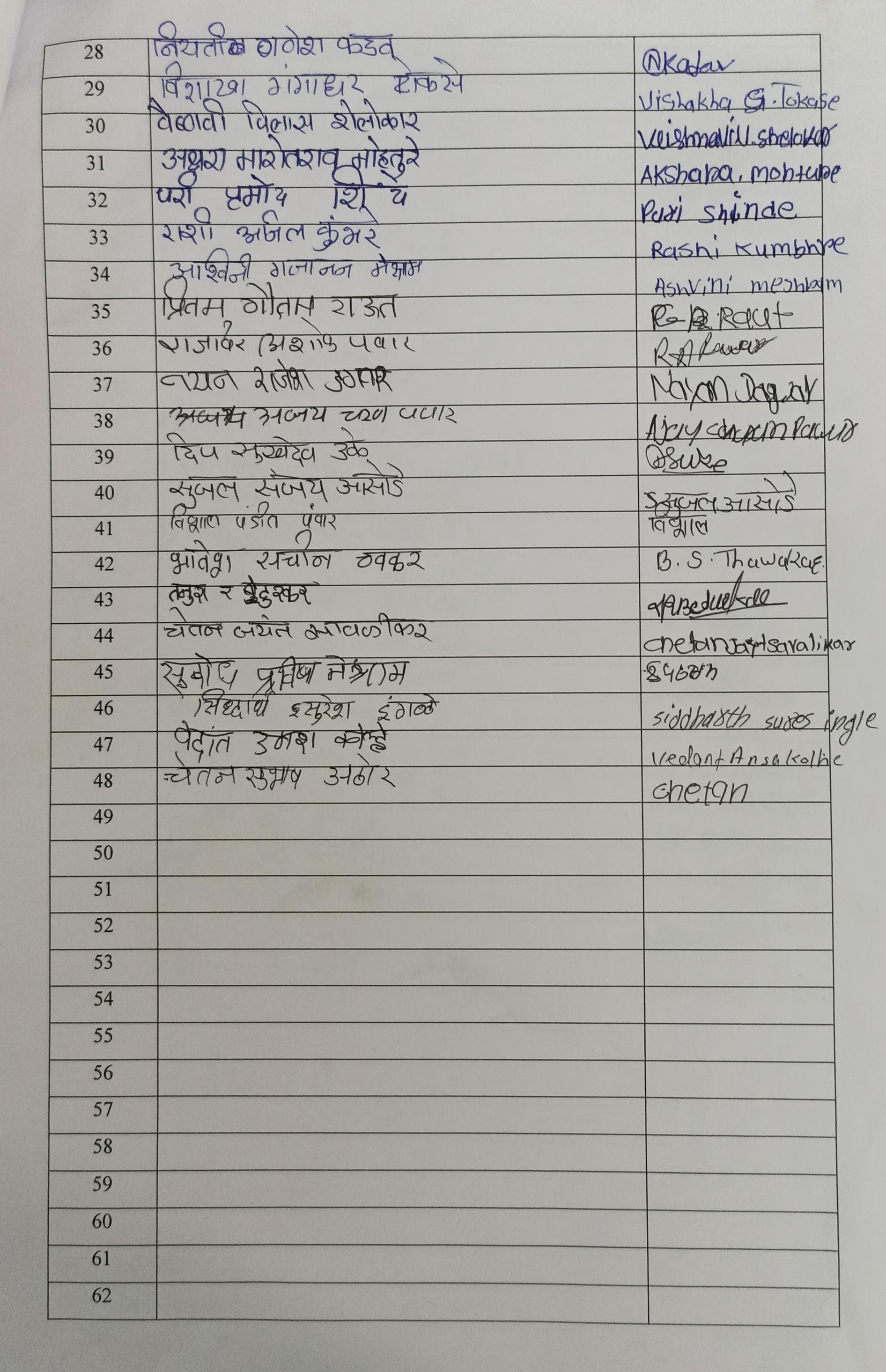 |
 |